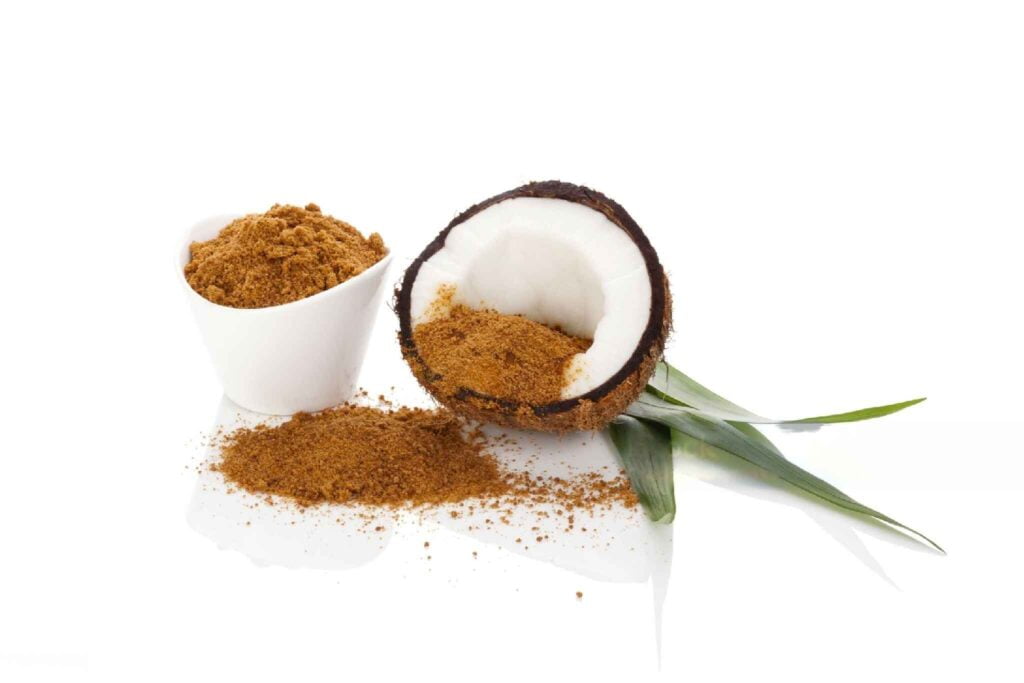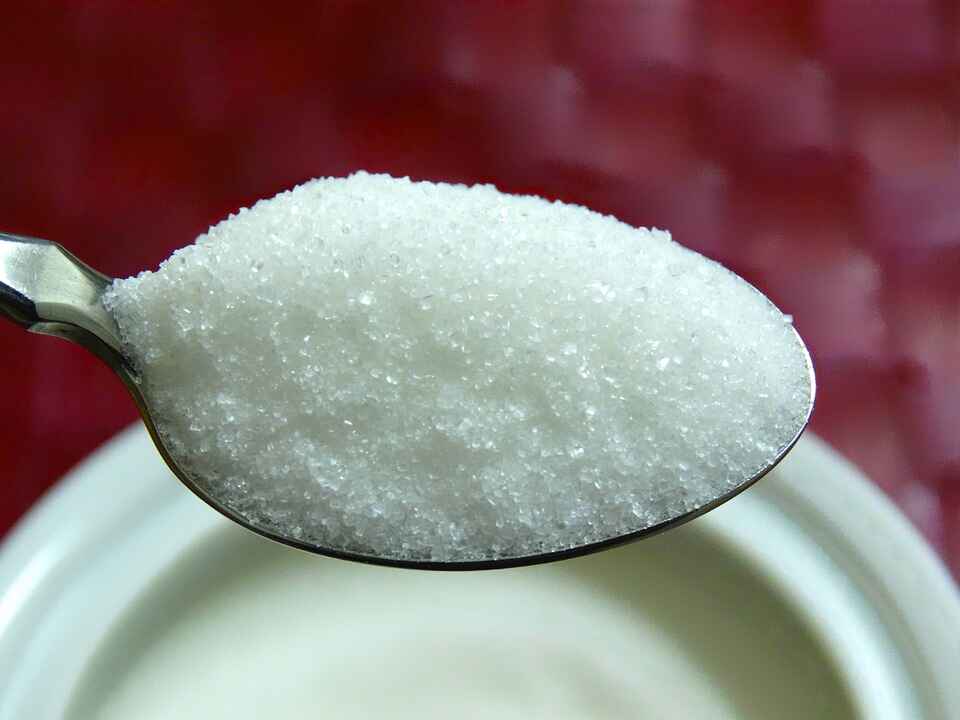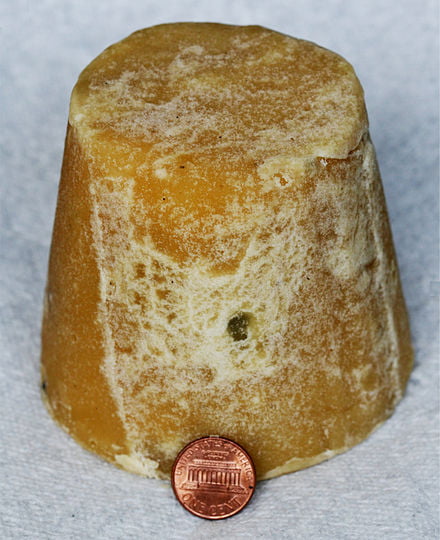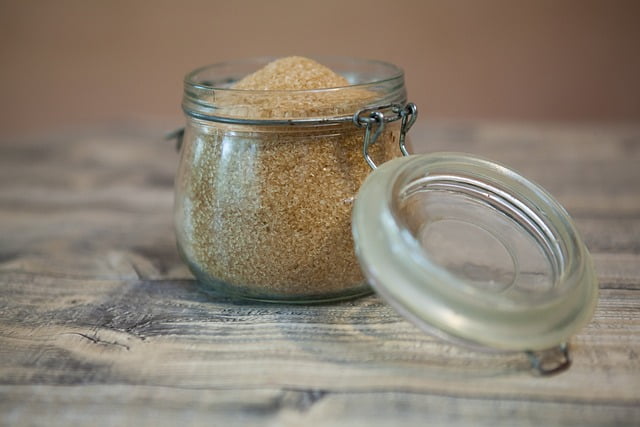
Image credit- Getty
What is the process of making palm sugar from coconuts?
The process of producing palm sugar from coconuts involves a series of carefully executed steps.
- Firstly, the sap is harvested from the flowers of the coconut palm tree by cutting the flower stem and collecting the dripping sap in a container.
- Subsequently, the sap is boiled in a large pot to reduce its volume and concentrate the sugar content. The duration of the boiling process varies depending on the desired thickness of the palm sugar.
- During this process, any impurities that rise to the surface must be carefully skimmed off to ensure a clear and pure final product.
- Once the desired thickness is achieved, the sap is removed from the heat and allowed to cool. The cooled sap is then poured into moulds, which can be of various shapes and sizes, although round or rectangular moulds are commonly used.
- After solidification, the palm sugar is taken out of the moulds and placed in a dry, well-ventilated area to undergo a drying process that typically lasts several days, contingent upon the prevailing climate and conditions.
- Once completely dry, the palm sugar can be ground into a fine powder using either a traditional stone grinder or a modern food processor.
- It is advisable to carry out this grinding process just before using the palm sugar, as it tends to deteriorate once ground.
The result is coconut palm sugar, a natural and unrefined sweetener that is highly sought after in numerous traditional Southeast Asian dishes and desserts.
What is the nutrition value of coconut sugar?
Coconut sugar is widely regarded as a more natural and less refined alternative to traditional table sugar. A nutritional analysis of coconut sugar per 100 grams reveals the following approximate values:
- Calories: 375
- Carbohydrates: 92g
- Sugars: 85g
- Fiber: 2.6g
- Fat: <1g
- Protein: <1g
- Minerals: Coconut sugar contains trace amounts of minerals such as potassium, zinc, and iron.
It is important to note that coconut sugar is still a high-calorie sweetener, with a similar calorie content to regular sugar. Its popularity stems from its perceived health benefits and lower glycemic index, which means it may have a slower impact on blood sugar levels than table sugar. However, it should be consumed in moderation as part of a balanced diet.
Benefits of consuming coconut sugar
Coconut sugar is frequently touted as a more natural and potentially healthier substitute for refined sugars. It offers several potential advantages, including:
1. Lower Glycemic Index: Coconut sugar possesses a lower glycemic index (GI) in comparison to regular table sugar. Consequently, it may result in a slower and more gradual increase in blood sugar levels, which can be advantageous for individuals seeking to manage their blood sugar.
2. Nutrient Content: Although the mineral content in coconut sugar, such as potassium, zinc, and iron, is relatively low, it still contributes some nutritional value.
3. Reduced Processing: Coconut sugar typically undergoes less processing than white sugar, thereby retaining some of the nutrients present in the sap of the coconut palm.
4. Natural Sweetener: Derived from the sap of coconut palm trees, coconut sugar is regarded as a more natural sweetener when compared to highly refined sugars.
5. Taste: Many individuals appreciate the caramel-like flavor of coconut sugar, which can add a distinctive taste to recipes.
It is crucial to recognize that while coconut sugar offers potential benefits, it should still be consumed in moderation, similar to any other sweetener. It is not a low-calorie food, and excessive consumption of any sugar can have adverse health effects. Furthermore, if you have specific dietary concerns or health conditions, it is advisable to consult with a healthcare professional or registered dietitian before making significant changes to your diet.
Disadvantages of consuming coconut sugar
Coconut sugar has gained popularity as a natural sweetener, but it is important to consider its disadvantages and limitations.
- Firstly, coconut sugar is calorie-dense, providing approximately 375 calories per 100 grams, which can contribute to weight gain if consumed excessively.
- Additionally, despite being less refined, coconut sugar is still primarily composed of sugars, containing about 85 grams of sugar per 100 grams, which can lead to various health issues such as obesity, diabetes, and heart disease.
- Furthermore, while coconut sugar does contain small amounts of minerals like potassium, zinc, and iron, these quantities are not substantial enough to provide significant nutritional benefits.
- Additionally, the production of coconut sugar may have environmental implications, such as deforestation and habitat destruction in some regions where coconut palms are grown.
- Moreover, coconut sugar is often more expensive than regular sugar, which can be a disadvantage for individuals on a tight budget.
- Moreover, some people may not prefer the taste or texture of coconut sugar in certain recipes, as it has a distinct flavor that can alter the taste of dishes.
- Lastly, coconut sugar may not be as readily available as regular sugar in all regions, making it less convenient for some consumers.
- In conclusion, while coconut sugar does offer some potential advantages over refined sugars, such as a lower glycemic index and slightly better nutrient content, it is important to use it in moderation and be aware of its calorie and sugar content.
- It may not be suitable for all dietary preferences and needs, and individuals should consider their specific health goals and circumstances when choosing sweeteners.
Difference between coconut sugar and regular sugar?

Image credit – Pixabay
Regular sugar, typically white or granulated, and coconut sugar are both sweeteners, but they possess distinct characteristics:
1. Source:
- Regular Sugar: Regular sugar is derived from sugar cane or sugar beets and undergoes extensive processing and refining to produce the commonly used white granulated sugar.
- Coconut Sugar: Coconut sugar is made from the sap of coconut palm trees and is considered a more natural sweetener due to its less refined nature.
2. Composition:
- Regular Sugar: Regular sugar primarily consists of sucrose, a disaccharide composed of glucose and fructose.
- Coconut Sugar: Coconut sugar also contains sucrose like regular sugar, but it additionally contains small amounts of glucose and fructose. It also contains trace amounts of minerals such as potassium, zinc, and iron.
3. Flavor and Color:
- Regular Sugar: Regular sugar has a neutral, sweet taste and appears white in color.
- Coconut Sugar: Coconut sugar possesses a caramel-like flavor with a subtle hint of coconut. Its lower level of processing gives it a brown or tan color.
4. Glycemic Index:
- Regular Sugar: Regular sugar has a high glycemic index (GI), leading to a rapid increase in blood sugar levels upon consumption.
- Coconut Sugar: Coconut sugar has a lower GI compared to regular sugar, resulting in a slower and more gradual impact on blood sugar levels. This characteristic can be advantageous for individuals monitoring their blood sugar.
5. Nutritional Content:
- Regular Sugar: Regular sugar lacks significant nutritional value and primarily provides empty calories.
- Coconut Sugar: Although coconut sugar contains small amounts of minerals, the quantities are not substantial enough to offer significant nutritional benefits. It does not serve as a significant source of these nutrients.
6. Environmental Impact:
The production of sugar from sugar cane or sugar beets can have environmental impacts, such as water usage and pesticide use. Similarly, the environmental impact of coconut sugar production can vary, but it can potentially lead to deforestation in regions where coconut palms are grown.
7. Availability and Cost:
Regular sugar is widely available and typically more affordable than coconut sugar, which may be less readily available and tends to be more expensive. In conclusion, coconut sugar is often preferred as a natural and potentially healthier alternative to regular sugar due to its lower glycemic index and trace mineral content. However, it should still be consumed in moderation, as it is calorie-dense and primarily composed of sugars. The choice between the two sweeteners often depends on individual dietary preferences and specific health goals.
Difference between coconut sugar and jaggery?

Image credit -Fr.wiktionary
The selection between jaggery and coconut sugar is contingent upon individual dietary preferences and specific health objectives. Both jaggery and coconut sugar possess distinct characteristics and potential advantages:
Jaggery:
- Source: Jaggery is typically derived from sugarcane juice or palm sap, such as date palm or coconut palm.
- Flavor: Jaggery exhibits a unique, sweet, and earthy taste with subtle notes of molasses. The flavor may vary depending on the source.
- Nutritional Content: Jaggery contains certain vitamins and minerals, including iron, calcium, and phosphorus. It also contains antioxidants.
- Glycemic Index: Jaggery generally has a higher glycemic index compared to coconut sugar, resulting in a relatively faster increase in blood sugar levels.
- Availability: Jaggery is widely accessible in numerous regions, particularly in South Asia.
Coconut Sugar:
- Source: Coconut sugar is derived from the sap of coconut palm trees.
- Flavor: Coconut sugar possesses a caramel-like flavor with a hint of coconut.
- Nutritional Content: While it contains trace amounts of minerals like potassium, zinc, and iron, the quantities are not significant enough to provide substantial nutritional benefits.
- Glycemic Index: Coconut sugar has a lower glycemic index compared to jaggery, meaning it has a slower impact on blood sugar levels.
- Availability: Coconut sugar may be less readily available in certain regions compared to jaggery.
Considerations for choosing between the two options include:
- Blood Sugar Management: If the management of blood sugar levels is a priority, coconut sugar may be a slightly preferable choice due to its lower glycemic index.
- Taste and Recipe Preference: The decision between jaggery and coconut sugar can also be influenced by personal taste and the desired flavor profile in recipes.
- Nutrient Content: If a sweetener with slightly higher mineral content is desired, jaggery might be a more suitable option.
- Environmental and cultural factors; play a significant role in determining the availability and regional preferences of certain food products. For instance, jaggery is predominantly utilized in South Asian cuisine, whereas coconut sugar is commonly found in various Southeast Asian cuisines.
It is crucial to note that both jaggery and coconut sugar are natural sweeteners and do not possess any extraordinary nutritional properties. They are primarily sources of calories and sugars, thus it is imperative to consume them in moderation as part of a well-balanced diet. If you have specific dietary concerns or health conditions, it is advisable to seek guidance from a healthcare professional or a registered dietitian.
Difference between coconut sugar and brown sugar?

Image credit – Pixabay
- Coconut sugar and brown sugar are alternative options to traditional white sugar, but they differ in terms of their origin, taste, and nutritional composition.
- Coconut sugar is derived from the sap of coconut palm trees. The sap is collected and then heated to remove the moisture, resulting in granules or blocks of sugar. On the other hand, brown sugar is typically made from sugar cane or sugar beet juice. It can be further classified into light brown sugar and dark brown sugar, with the latter containing more molasses and therefore having a stronger flavor.
- In terms of taste, coconut sugar has a caramel-like flavor with a subtle hint of coconut, adding a unique and earthy sweetness to dishes. Brown sugar, on the other hand, has a distinct molasses flavor and aroma. Dark brown sugar has a more pronounced molasses taste compared to light brown sugar.
- In terms of color, coconut sugar and light brown sugar have a similar brown or tan hue. However, dark brown sugar is darker due to its higher molasses content.
- When it comes to nutritional content, both coconut sugar and brown sugar primarily consist of sugars and calories. While coconut sugar contains trace amounts of minerals such as potassium, zinc, and iron, these quantities are not significant enough to provide substantial nutritional benefits. Similarly, brown sugar retains some molasses, which adds a small amount of minerals like calcium, potassium, and iron. However, the nutritional value of both sugars is limited.
- In terms of moisture content, coconut sugar is generally drier and less prone to clumping compared to brown sugar. Brown sugar, on the other hand, has a higher moisture content, which can cause it to clump over time if not stored properly.
- To summarize, coconut sugar and brown sugar are viable substitutes for white sugar in a range of recipes. These sweeteners impart distinct flavors that can add a nuanced dimension to your culinary creations.
- It is crucial to bear in mind, however, that they are still high-calorie sweeteners and should be consumed in moderation as part of a well-rounded diet. Your selection between the two may hinge on your taste preferences and dietary requirements.
Consumption of coconut sugar reduces body fat?
Coconut sugar, much like other sweeteners, is a calorie-dense product that is primarily composed of sugars. While it may offer some minor benefits over regular sugar, it is not a guaranteed solution for weight loss. It is important to consider several factors when evaluating the potential impact of coconut sugar on weight loss.
- Firstly, coconut sugar provides approximately 375 calories per 100 grams, which is similar to the calorie content of regular sugar. Consuming excess calories from any source, including coconut sugar, can lead to weight gain if not controlled.
- Secondly, coconut sugar, like regular sugar, is high in sugar content. High sugar intake can contribute to weight gain and obesity, as well as other health issues like type 2 diabetes.
- Thirdly, coconut sugar has a lower glycemic index compared to regular sugar, meaning it has a slower impact on blood sugar levels. While this may be beneficial for blood sugar control, it does not necessarily translate into significant weight loss.
- It is important to use coconut sugar sparingly as a sweetener rather than as a main source of calories. Additionally, weight loss is best achieved through a balanced diet that includes a variety of nutrient-rich foods, portion control, and regular physical activity. Simply switching to coconut sugar without addressing other aspects of your diet is unlikely to lead to substantial weight loss.
- Finally, weight loss is a highly individualized process that depends on several factors, including dietary preferences, metabolism, and any underlying health conditions. Therefore, it is important to consider these individual factors when evaluating the potential impact of coconut sugar on weight loss.
When seeking to manage weight or implement dietary modifications, it is recommended to seek guidance from a healthcare professional or a registered dietitian. These experts possess the knowledge and expertise to offer personalized advice and assist in developing a sustainable and efficient weight loss strategy tailored to your individual requirements and objectives. It is important to bear in mind that there is no miraculous food or ingredient that guarantees weight loss; rather, the overall quality and equilibrium of your diet are of utmost significance.
Is the consumption of coconut sugar permissible for individuals with diabetes?
Coconut sugar is frequently marketed as a superior sweetener option for individuals with diabetes due to its lower glycemic index in comparison to regular sugar. However, it is important to note that its impact on blood sugar levels is not insignificant, and it should still be consumed in moderation by those with diabetes. The following are some key considerations:
- Glycemic Index (GI): Coconut sugar has a lower glycemic index (GI) than regular sugar, which means that it raises blood sugar levels more slowly and to a lesser extent than table sugar. Nevertheless, it can still cause increases in blood sugar levels, and individuals with diabetes should use it with caution.
- Portion Control: Individuals with diabetes must be mindful of their carbohydrate intake, including sugars. Even though coconut sugar has a lower GI, consuming large amounts can still lead to blood sugar spikes. Therefore, portion control is critical.
- Individual Response: Blood sugar responses to sweeteners can vary from person to person. What affects one person’s blood sugar levels may not have the same impact on another. Therefore, it is important for individuals with diabetes to monitor their own blood sugar levels and adjust their diet accordingly.
- Dietary Balance: The overall quality of one’s diet is more important than just the choice of sweetener. A balanced diet that includes a variety of nutrient-rich foods, controlled portions, and regular monitoring of blood sugar levels is crucial for managing diabetes.
- Consult a Healthcare Professional: If you have diabetes and are considering using coconut sugar or making any significant dietary changes, it is essential to consult with a healthcare professional or a registered dietitian. They can provide personalized guidance based on your specific health needs and goals.
- Read more about Coconut Aminos recipe, taste and benefits
In brief, coconut sugar presents a more favorable alternative to regular sugar for individuals with diabetes, owing to its lower glycemic index. Nonetheless, it is imperative to exercise prudence in its usage and incorporate it into a comprehensive diabetes management regimen that encompasses portion control, balanced nutrition, and consistent monitoring of blood sugar levels. It is advisable to seek expert advice when making dietary decisions to effectively manage diabetes.
Can coconut sugar be used in the tea and coffee?

Image credit – Unsplash
Coconut sugar can be utilized as a sweetening agent in coffee and tea, similar to regular sugar. It possesses a distinctive caramel-like taste with a subtle hint of coconut, which can impart a unique flavor to your beverages. Here are the recommended steps for incorporating it:
Coffee:
- Following the brewing process, simply blend in the desired quantity of coconut sugar until it dissolves completely. It is advisable to commence with a small amount and adjust according to personal taste preferences. This sweetener can be used in both hot and iced coffee preparations.
Tea:
- While the tea is still hot, introduce coconut sugar and stir until it dissolves entirely.
- The quantity of coconut sugar required may vary depending on the type of tea and individual taste preferences, as different teas possess distinct flavors.
Incorporating coconut sugar into your coffee and tea can offer a natural and slightly different taste in comparison to regular sugar. However, it is important to exercise moderation when using this sweetener, as it is calorie-dense like other sweetening agents. Additionally, it is crucial to be mindful of your overall sugar intake, particularly if you have specific dietary or health considerations.
